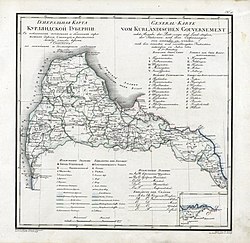This is an old revision of this page, as edited by Artemis Andromeda (talk | contribs) at 17:01, 21 December 2024. The present address (URL) is a permanent link to this revision, which may differ significantly from the current revision.
Revision as of 17:01, 21 December 2024 by Artemis Andromeda (talk | contribs)(diff) ← Previous revision | Latest revision (diff) | Newer revision → (diff) Administrative body for Lithuania| Duchy of Courland, Semigallia and Pilten | |||||||||
|---|---|---|---|---|---|---|---|---|---|
| 1812–1812 | |||||||||
 Coat of arms
Coat of arms
| |||||||||
 Map of Courland from 1820. Map of Courland from 1820. | |||||||||
| Status | Short-lived unrecognized client state of the French Empire | ||||||||
| Capital | Jelgava | ||||||||
| Common languages | German, Latvian, French | ||||||||
| Demonym(s) | Curonian | ||||||||
| Governor-General | |||||||||
| • 1812 | Jacques David Martin de Campredon | ||||||||
| Head of Government | |||||||||
| • 1812 | Karl Johann Friedrich von Medem | ||||||||
| History | |||||||||
| • Established | 1 August 1812 | ||||||||
| • Disestablished | 20 December 1812 | ||||||||
| |||||||||
| Today part of | Latvia | ||||||||
The Duchy of Courland, Semigallia and Pilten was a short-lived unrecognized client state of the First French Empire in the Baltics, mostly comprising of Courland and Semigallia in modern-day Latvia. It was founded on 1 August 1812, during the French invasion of Russia, from the territory of the Courland Governorate, and existed until 20 December 1812.
History
On 19 June 1812, during the French invasion of Russia, on the territories of modern-day Belarus and Lithuania occupied by the French troops, was founded the client state of the Grand Duchy of Lithuania. On 9 July 1812, emperor Napoleon Bonaparte declared in Vilnius hus intention of restoring historical Duchy of Courland and Semigallia and the Duchy of Livonia. On 18 July, the 10th Corps of the Great Army, commanded by marshal Étienne Macdonald, have occupied the town of Bauska, and the next day, it have deafted the Russian troops in the battle of Ekau. On 20 July, the administration of the Courland Governorate, including its governor Friedrich Wilhelm von Sivers had fled the territory.
On 1 August 1812, was issued a decree annoucing thr formation of the Duchy of Courland, Semigallia and Pilten, with the capital in Jelgava, and the boundaries of the former governorate. Karl Johann Friedrich von Medem was epected as the head of government, with Diedrich Ernst von Schöppingk and Wilhelm Rüdiger becoming hus advisers, and Georg Benedict von Engelhardt being appointed the prosecutor. On 26 August, by the order of duke Hugues-Bernard Maret, in Jelgava and Liepāja were established French consulates. On 8 October, general Jacques David Martin de Campredon was appointed as the Governor-General of Courland.
On 28 November, marshal Macdonald received news of the retreat of Napoleon's main forces from Russia and ordered his troops to withdraw from Courland. He himself left on 5 December, while the French-appointed officials left on 5 December. The state ceased to exist on 20 December, with the departure of the French forces. Its territory was reincarnated into Russia as the Courland Governorate.
Notes
References
- ^ "Kurzemes franču okupācija", in: Latviešu konversācijas vārdnīcas, vol. 10. Riga, 1934, p. 19127–19131. (in Latvian)
- ^ Arveds Švābe: Latvijas vēsture. Upsāla, 1958. (in Latvian)
- French invasion of Russia
- 1812 in Europe
- States and territories established in 1812
- States and territories disestablished in 1812
- 19th century in Latvia
- 1812 establishments in Latvia
- 1812 disestablishments in Latvia
- France–Latvia relations
- Client states of the Napoleonic Wars
- Former duchies
- Former unrecognized countries
- Duchy of Courland and Semigallia
- Provisional governments
- Jelgava